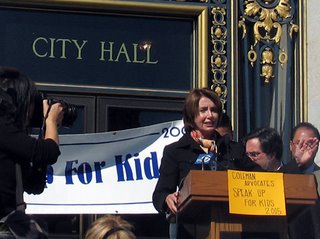Judging From History, Stalemate Likely for New Democratic Congress According to Historian

If Democrats have lofty visions of enacting sweeping change in American government upon taking control of House and Senate today, a look at history may be sobering. Stalemate is the most likely result when a newly elected Congress of one party faces a president of the other, according to Bruce Carlson, host of the My History Can Beat Up Your Politics podcast, which provides listeners with a historical spin on politics.
The new 110th Congress convenes today in Washington, with Democrats in control of both houses for the first time since 1994. Rep. Nancy Pelosi is to be sworn in as speaker of the House. A Democrat from California, Pelosi will be the first U.S. female House speaker. Sen. Harry Reid, Democrat of Nevada, will be elevated to Senate majority leader. Reid had led Democrats in the Senate as minority leader since 2005.
Pelosi and Reid owe their success to Democrats who won seats in the November elections, in which voters turned away from Republicans due to dissatisfaction with the war in Iraq and other issues.
In 1794, during George Washington's second term, a majority of Republicans opposed to his administration were elected to the House. Eager to flex their muscle, they attempted to scrap Washington's unpopular treaty with England. In a showdown that followed, the new Republicans were painted as obstructionists, and forced to back down.
In 1930, Democrats took control of the House during the Great Depression and Herbert Hoover's presidency. But the new House Democrats could do little to help the economy. An attempt to create a public works jobs program was vetoed by Hoover.
The Democrats who took the House in 1890, after Republicans had passed an oppressive tariff, could not reverse that tariff while Republican Benjamin Harrison was president. Reversal came only after the election of a Democratic president, Grover Cleveland.
"The president's veto is a powerful sword that cuts through partisan legislation," says Carlson.
The Gingrich Republicans, who took power after the 1994 midterms, did get through a balanced budget, and welfare reform, but only after negotiations with President Bill Clinton. Bills to eliminate the Education and Energy departments and to scale back Medicare were dropped. Income tax cuts and the repeal of the estate tax were saved for President Bush's signature.
"In many cases an opposition-party Congress will avoid the veto and wait for their own party's savior to arrive before proposing major change," says Carlson, whose show is available for free on Apple's iTunes service. "The Democrats of 1890 waited for Cleveland, the Democrats of 1930 waited for FDR. The '06 Democrats might just wait for Hillary or Obama."
Sens. Hillary Rodham Clinton of New York and Barack Obama of Illinois are each weighing potential runs for the Democratic nomination for president in 2008.
Bookmark http://universeeverything.blogspot.com/ and drop back in sometime.


0 Comments:
Post a Comment
Subscribe to Post Comments [Atom]
<< Home